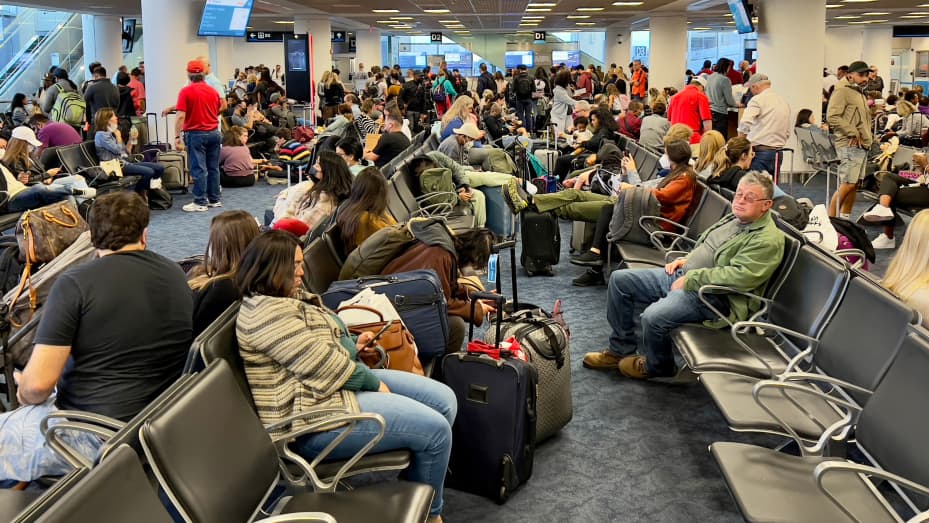Overcrowding, Flight Delays, And Staffing Shortages Ruin Summer Air Travel
The overcrowding, flight delays, and staffing shortages ruin summer air travel and experts are worried. The current situation of U.S. air travel is being hindered by these issues and these challenges are occurring at a time when industry analysts had anticipated a return to normality following years of delays caused by the epidemic.
Author:Jane RestureSep 05, 20234.6K Shares141.4K Views

The overcrowding, flight delays, and staffing shortages ruin summer air traveland experts are worried. The current situation of U.S. air travelis being hindered by these issues and these challenges are occurring at a time when industry analysts had anticipated a return to normality following years of delays caused by the pandemic.
The prevailing conditions have contributed to what several passengers and industry professionals have characterized as an unpleasant summer travel season.
Overcrowding And Record Bookings
This year, air traffic has increased significantly, with passenger numbers exceeding pre-pandemic levels. Overcrowding has resulted, making flying increasingly unpleasant for millions of people.
The Transportation Security Administration (TSA) reported a single-day peak for US air travel on June 30, with more than 2.88 million passengers going through TSA checkpoints at airports around the country.
The US Department of Transportation said that US airlines transported 81.8 million scheduled domestic and international passengers in May, the most recent month for which data is available. Meanwhile, the load factor for scheduled flights for US airlines averaged 85.1% in May, slightly shy of 86.2% in the same month in 2019, before the epidemic.
Flight Postponements And Cancellations
Flight cancellations and delays have been a source of frustration for passengers this summer, and they may break last year's record. Earlier this summer, severe weather and wildfire smoke caused thousands of flight cancellations in the Northeast, while Hurricane Idalia's late August landfall in Florida disrupted flights across the Southeast.
So far in 2023, the proportion of on-time flights reported by the Department of Transportation has averaged just 76.5%, marginally higher than last year's record low of 76.25%, based on data dating back to 2014.
Pilot Shortages
The airline sector is experiencing a manpower deficit, from pilots to air traffic controllers. According to consultancy Oliver Wyman, the pilot shortage will worsen over the next decade, worsened by an aging workforce and a diminishing pool of candidates—trends hastened by the pandemic.
The epidemic forced many elderly pilots to retire early, while a mandated retirement age of 65 for commercial pilots, imposed for health and public safety concerns, prevented some pilots from working longer.
Nowhere is the pilot crisis more evident than in North America, where about 8,000 pilots, or 11% of the overall pilot workforce, are now unavailable. The airline sector is expected to have 80,000 pilots short by 2032.
A Fortune For Airlines
While recent months have been less than ideal for travelers, airlines have benefited from record reservations. Passenger revenue at United Airlines (UAL) increased 20%year on year in the fiscal quarter ended June 30, while net income more than quadrupled to $1.08 billion.
During the quarter, the firm flew an average of 2,400 daily trips, the most ever. American Airlines (AAL) CEO Robert Isom hailed his company's success in the most recent fiscal quarter, calling it a "fantastic quarter" with "historically strong levels." The airline had a remarkable load factor of 86%, which was somewhat higher than the previous industry average.
The United States Congress Takes Actions
Passenger unhappiness and increasingly turbulent plane travel have prompted calls for government intervention. In July, the United States House of Representatives decisively enacted a bill to address problems in the aviation sector, which was backed by the Biden administration.
The measure dubbed the "Securing Growth and Robust Leadership in American Aviation Act," required airlines to improve traveler safety, fairly recompense customers, and provide safeguards for disabled passengers.
Final Words
It also urged the FAA to enhance the employment of air traffic controllers and granted monies to update aviation infrastructure and technology. To Alleviate the looming pilot shortage, the measure increased the retirement age for commercial airline pilots from 65 to 67.

Jane Resture
Author
Since she embarked on her first world trip in 2002, Jane Resture spent the past decades sharing her personal journey and travel tips with people around the world. She has traveled to over 80 countries and territories, where she experienced other cultures, wildlife she had only read about in books, new foods, new people, and new amazing experiences.
Jane believes that travel is for everyone and it helps us learn about ourselves and the world around us. Her goal is to help more people from more backgrounds experience the joy of exploration because she trusts that travel opens the door to the greatest, most unforgettable experiences life can offer and this builds a kinder, more inclusive, more open-minded world.
Latest Articles
Popular Articles